Mobile Robotics
Mathematics, Models, and Methods
Mobile Robotics offers comprehensive coverage of the essentials of the field suitable
for both students and practitioners. Adapted from the author's graduate and undergrad-
uate courses, the content of the book reflects current approaches to developing effective
mobile robots. Professor Alonzo Kelly adapts principles and techniques from the fields
of mathematics, physics, and numerical methods to present a consistent framework in a
notation that facilitates learning and highlights relationships between topics. This text
was developed specifically to be accessible to senior-level undergraduates in engineer-
ing and computer science, and includes supporting exercises to reinforce the lessons of
each section. Practitioners will value the author’s perspectives on practical applications
of
implementable algorithms
extracted from real systems wherever possible, to enhance the real-world relevance of
the text.
these principles. Complex subjects are reduced
to
Alonzo Kelly holds undergraduate degrees in aerospace engineering and computer
science, and graduate degrees in robotics. Dr. Kelly worked in the aerospace industry
for ten years before returning to academia. As a professor at the Robotics institute at
Carnegie Mellon University, he teaches mobile robotics at the graduate and under-
graduate levels, conducting research in robot simulation, modeling, controls, position
estimation, motion planning, and human interfaces.
�
�
Mobile Robotics
Mathematics, Models, and Methods
Alonzo Kelly
Carnegie Mellon University
�
32 Avenue of the Americas, New York NY 10013-2473, USA
Cambridge University Press is part of the University of Cambridge.
It furthers the University’s mission by disseminating knowledge in the pursuit of
education, learning, and research at the highest international levels of excellence.
www.cambridge.org
Information on this title: www.cambridge.org/9781107031159
© Alonzo Kelly 2013
This publication is in copyright. Subject to statutory exception
and to the provisions of relevant collective licensing agreements,
no reproduction of any part may take place without the written
permission of Cambridge University Press.
First published 2013
Printed in the United States of America
A catalog record for this publication is available from the British Library.
Library of Congress Cataloging in Publication data
Kelly, Alonzo.
Mobile robotics : mathematics, models and methods / Alonzo Kelly.
pages cm
Includes bibliographical references and index.
ISBN 978-1-107-03115-9 (hardback)
1. Mobile robots–Textbooks.
TJ211.415.K39 2013
629.8′932–dc23
2013022113
I. Title.
ISBN 978-1-107-03115-9 Hardback
Cambridge University Press has no responsibility for the persistence or accuracy of
URLs for external or third-party Internet Web sites referred to in this publication,
and does not guarantee that any content on such Web sites is, or will remain, accurate
or appropriate.
�
Contents
Preface
1 Introduction
1.1
1.2
1.3
Applications of Mobile Robots
Types of Mobile Robots
1.2.1
1.2.2
1.2.3
1.2.4
1.2.5
1.2.6
Automated Guided Vehicles (AGVs)
Service Robots
Cleaning and Lawn Care Robots
Social Robots
Field Robots
Inspection, Reconnaissance, Surveillance,
and Exploration Robots
Mobile Robot Engineering
1.3.1
1.3.2
1.3.3
1.3.4
1.3.5
Mobile Robot Subsystems
Overview of the Text
Fundamentals of Wheeled Mobile Robots
References and Further Reading
Exercise
2 Math Fundamentals
2.1
2.2
Notational Conventions
Embedded Coordinate Frames
References and Further Reading
Conventions and Definitions
2.1.1
2.1.2
2.1.3
Matrices
2.2.1
2.2.2
2.2.3
2.2.4
2.2.5
2.2.6
2.2.7
2.2.8
2.2.9
Matrix Operations
Matrix Functions
Matrix Inversion
Rank-Nullity Theorem
Matrix Algebra
Matrix Calculus
Leibnitz’ Rule
References and Further Reading
Exercises
v
page xiii
1
2
2
2
3
4
4
5
6
7
7
8
9
11
11
12
12
13
17
21
21
21
24
25
28
29
31
39
40
40
�
vi
2.3
2.4
2.5
2.6
2.7
2.8
C O N T E N T S
Forward Kinematics
Inverse Kinematics
Differential Kinematics
References and Further Reading
Exercises
Definitions
Why Homogeneous Transforms
Semantics and Interpretations
References and Further Reading
Exercises
Fundamentals of Rigid Transforms
2.3.1
2.3.2
2.3.3
2.3.4
2.3.5
Kinematics of Mechanisms
2.4.1
2.4.2
2.4.3
2.4.4
2.4.5
Orientation and Angular Velocity
2.5.1
2.5.2
2.5.3
2.5.4
2.5.5
2.5.6
Kinematic Models of Sensors
2.6.1
2.6.2
2.6.3
2.6.4
Transform Graphs and Pose Networks
2.7.1
2.7.2
2.7.3
2.7.4
2.7.5
2.7.6
Quaternions
2.8.1
2.8.2
2.8.3
2.8.4
2.8.5
2.8.6
2.8.7
Representations and Notation
Quaternion Multiplication
Other Quaternion Operations
Representing 3D Rotations
Attitude and Angular Velocity
References and Further Reading
Exercises
Orientation in Euler Angle Form
Angular Rates and Small Angles
Angular Velocity and Orientation Rates in Euler Angle Form
Angular Velocity and Orientation Rates in Angle-Axis Form
References and Further Reading
Exercises
Kinematics of Video Cameras
Kinematics of Laser Rangefinders
References and Further Reading
Exercises
Transforms as Relationships
Solving Pose Networks
Overconstrained Networks
Differential Kinematics Applied to Frames in General Position
References and Further Reading
Exercises
3 Numerical Methods
3.1
3.2
Linearization
Optimization of Objective Functions
Constrained Optimization
References and Further Reading
Exercises
Linearization and Optimization of Functions of Vectors
3.1.1
3.1.2
3.1.3
3.1.4
3.1.5
Systems of Equations
3.2.1
3.2.2
Linear Systems
Nonlinear Systems
41
41
42
43
55
56
57
57
61
66
69
69
70
70
75
77
79
81
81
82
82
83
89
90
90
90
93
95
97
102
103
103
104
105
107
109
111
114
114
116
116
117
120
124
130
130
131
131
136
�
C O N T E N T S
3.3
3.4
3.5
References and Further Reading
Exercises
Nonlinear Optimization
Constrained Optimization
References and Further Reading
Exercises
3.2.3
3.2.4
Nonlinear and Constrained Optimization
3.3.1
3.3.2
3.3.3
3.3.4
Differential Algebraic Systems
3.4.1
3.4.2
3.4.3
3.4.4
3.4.5
3.4.6
Integration of Differential Equations
3.5.1
3.5.2
3.5.3
3.5.4
Dynamic Models in State Space
Integration of State Space Models
References and Further Reading
Exercises
Constrained Dynamics
First- and Second-Order Constrained Kinematic Systems
Lagrangian Dynamics
Constraints
References and Further Reading
Exercises
4 Dynamics
4.1
4.2
4.3
4.4
Aspects of Rigid Body Motion
WMR Velocity Kinematics for Fixed Contact Point
Common Steering Configurations
References and Further Reading
Exercises
Moving Coordinate Systems
Context of Measurement
4.1.1
Change of Reference Frame
4.1.2
Example: Attitude Stability Margin Estimation
4.1.3
4.1.4
Recursive Transformations of State of Motion
References and Further Reading
4.1.5
4.1.6
Exercises
Kinematics of Wheeled Mobile Robots
4.2.1
4.2.2
4.2.3
4.2.4
4.2.5
Constrained Kinematics and Dynamics
Constraints of Disallowed Direction
4.3.1
Constraints of Rolling Without Slipping
4.3.2
Lagrangian Dynamics
4.3.3
4.3.4
Terrain Contact
Trajectory Estimation and Prediction
4.3.5
References and Further Reading
4.3.6
4.3.7
Exercises
Aspects of Linear Systems Theory
Linear Time-Invariant Systems
4.4.1
State Space Representation of Linear Dynamical Systems
4.4.2
Nonlinear Dynamical Systems
4.4.3
4.4.4
Perturbative Dynamics of Nonlinear Dynamical Systems
References and Further Reading
4.4.5
4.4.6
Exercises
vii
138
139
140
140
146
150
150
151
151
154
157
162
166
167
168
168
168
172
172
173
173
174
175
180
182
186
186
187
187
191
195
200
201
201
202
207
211
217
220
224
225
226
227
234
239
240
244
244
�
viii
4.5
C O N T E N T S
Predictive Modeling and System Identification
4.5.1
4.5.2
4.5.3
4.5.4
4.5.5
4.5.6
4.5.7
4.5.8
Braking
Turning
Vehicle Rollover
Wheel Slip and Yaw Stability
Parameterization and Linearization of Dynamic Models
System Identification
References and Further Reading
Exercises
5 Optimal Estimation
Variance of Continuous Integration and Averaging Processes
Stochastic Integration
Optimal Estimation
References and Further Reading
Exercises
5.1
5.2
5.3
5.4
Characterizing Uncertainty
Random Variables
Transformation of Uncertainty
Random Processes
References and Further Reading
Exercises
Random Variables, Processes, and Transformation
5.1.1
5.1.2
5.1.3
5.1.4
5.1.5
5.1.6
Covariance Propagation and Optimal Estimation
5.2.1
5.2.2
5.2.3
5.2.4
5.2.5
State Space Kalman Filters
5.3.1
5.3.2
5.3.3
5.3.4
5.3.5
5.3.6
5.3.7
5.3.8
Bayesian Estimation
5.4.1
5.4.2
5.4.3
5.4.4
5.4.5
5.4.6
5.4.7
Introduction
Linear Discrete Time Kalman Filter
Kalman Filters for Nonlinear Systems
Simple Example: 2D Mobile Robot
Pragmatic Information for Kalman Filters
Other Forms of the Kalman Filter
References and Further Reading
Exercises
Definitions
Bayes’ Rule
Bayes’ Filters
Bayesian Mapping
Bayesian Localization
References and Further Reading
Exercises
6 State Estimation
6.1
Mathematics of Pose Estimation
6.1.1
6.1.2
6.1.3
6.1.4
6.1.5
6.1.6
6.1.7
6.1.8
Pose Fixing versus Dead Reckoning
Pose Fixing
Error Propagation in Triangulation
Real Pose Fixing Systems
Dead Reckoning
Real Dead Reckoning Systems
References and Further Reading
Exercises
245
245
247
250
253
256
259
268
269
270
270
270
272
279
289
294
295
296
296
301
307
315
315
316
316
319
321
327
338
344
344
345
346
346
349
353
358
365
369
369
370
370
371
372
376
384
385
396
396
397
�
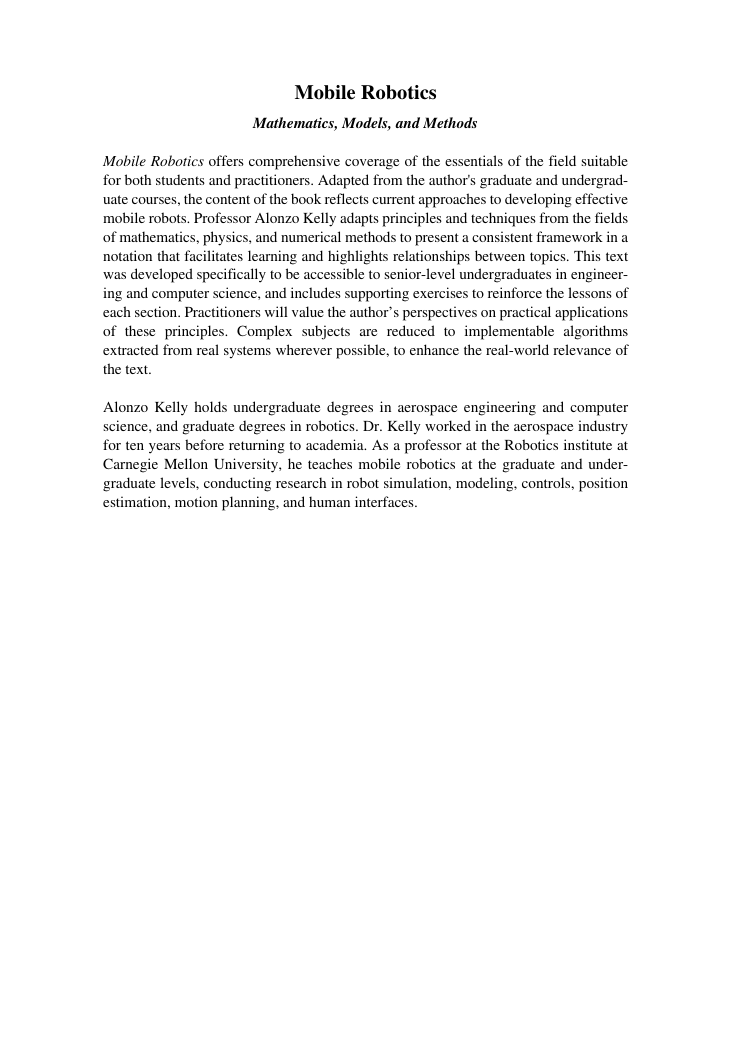

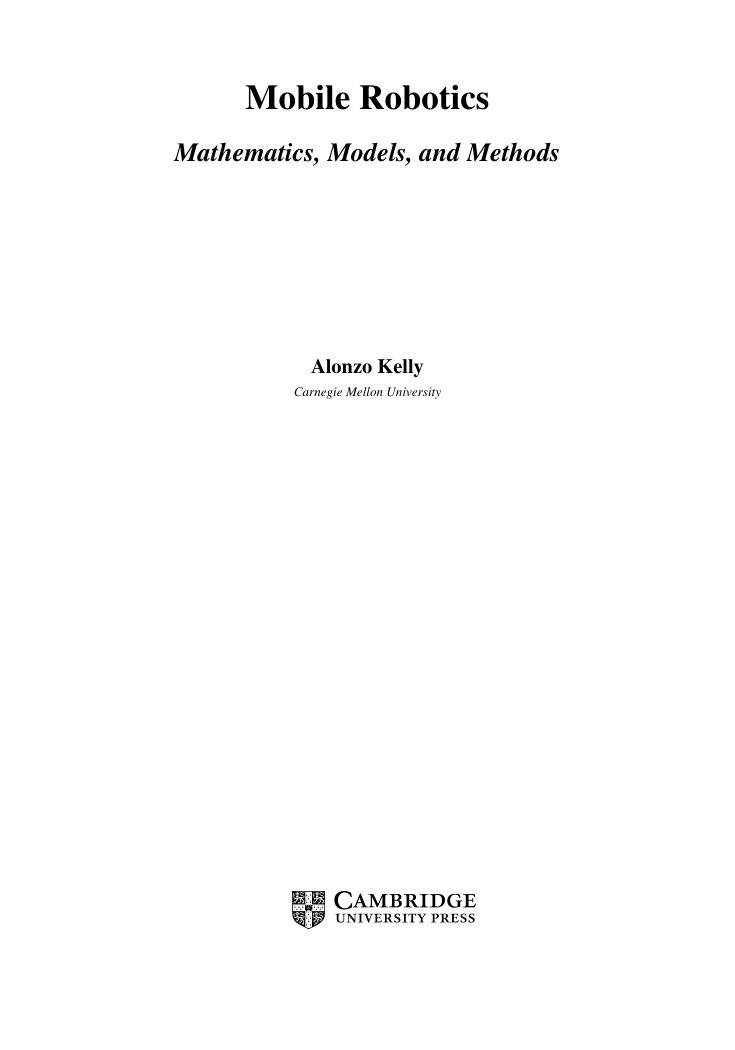
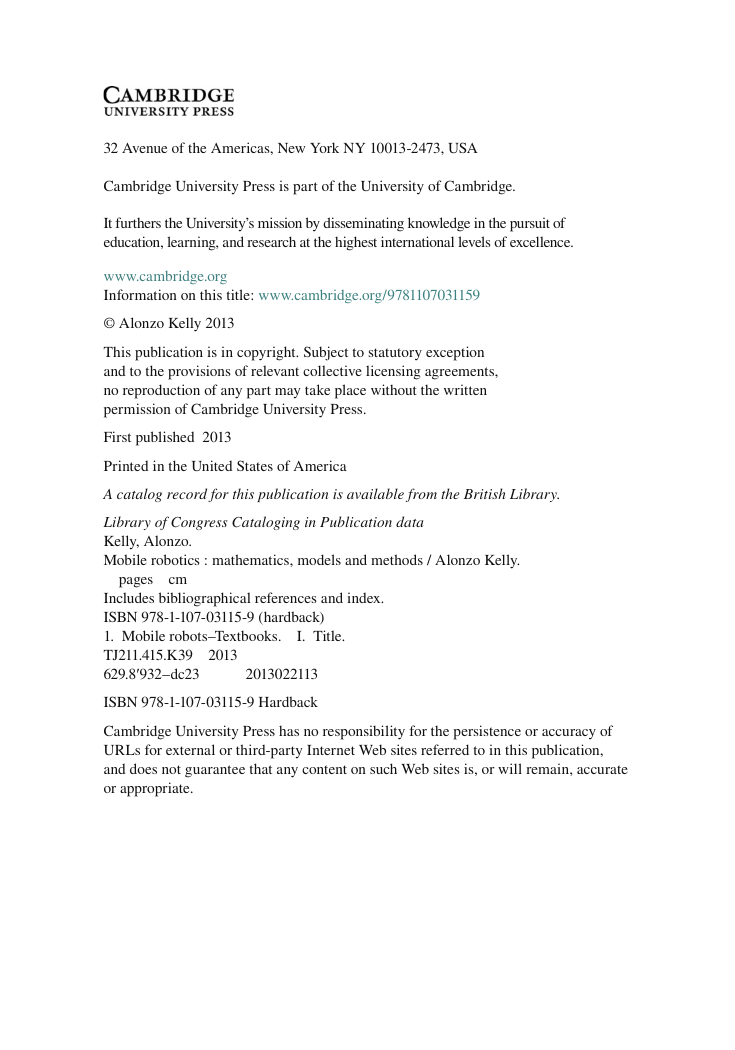
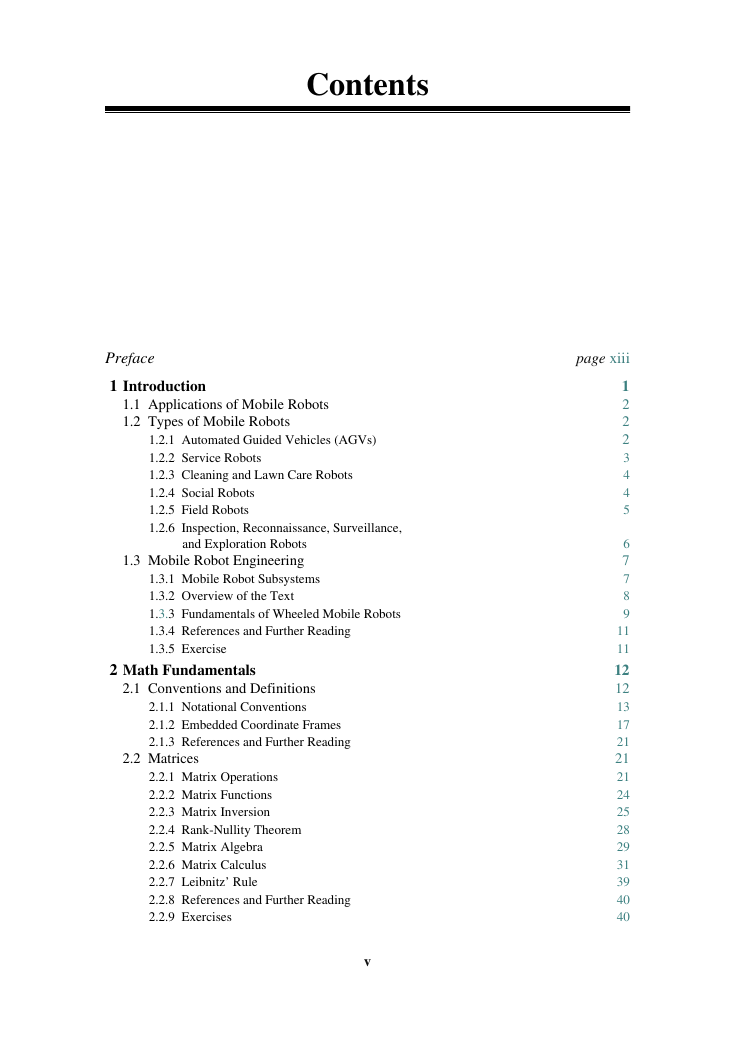
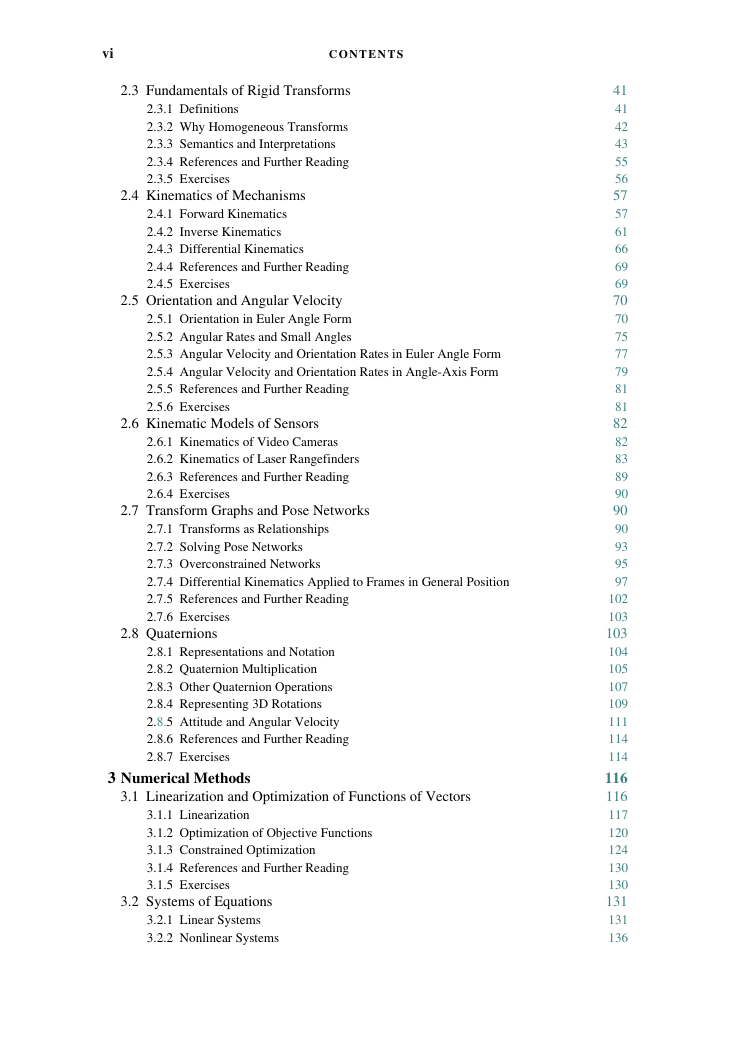
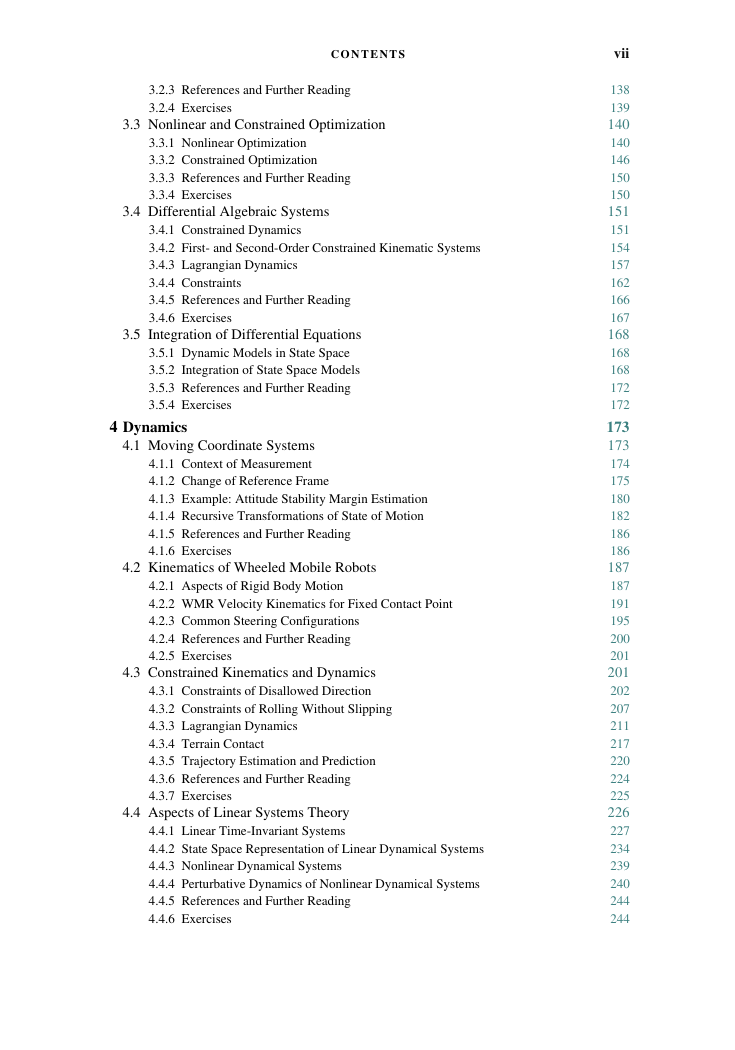
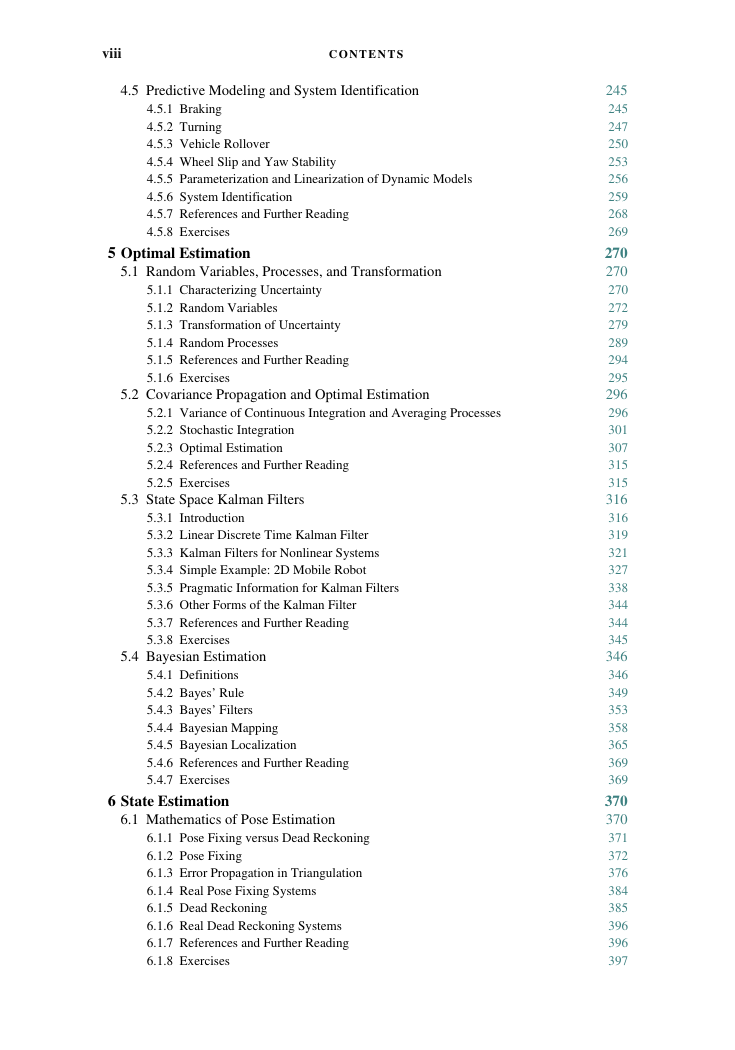








 2023年江西萍乡中考道德与法治真题及答案.doc
2023年江西萍乡中考道德与法治真题及答案.doc 2012年重庆南川中考生物真题及答案.doc
2012年重庆南川中考生物真题及答案.doc 2013年江西师范大学地理学综合及文艺理论基础考研真题.doc
2013年江西师范大学地理学综合及文艺理论基础考研真题.doc 2020年四川甘孜小升初语文真题及答案I卷.doc
2020年四川甘孜小升初语文真题及答案I卷.doc 2020年注册岩土工程师专业基础考试真题及答案.doc
2020年注册岩土工程师专业基础考试真题及答案.doc 2023-2024学年福建省厦门市九年级上学期数学月考试题及答案.doc
2023-2024学年福建省厦门市九年级上学期数学月考试题及答案.doc 2021-2022学年辽宁省沈阳市大东区九年级上学期语文期末试题及答案.doc
2021-2022学年辽宁省沈阳市大东区九年级上学期语文期末试题及答案.doc 2022-2023学年北京东城区初三第一学期物理期末试卷及答案.doc
2022-2023学年北京东城区初三第一学期物理期末试卷及答案.doc 2018上半年江西教师资格初中地理学科知识与教学能力真题及答案.doc
2018上半年江西教师资格初中地理学科知识与教学能力真题及答案.doc 2012年河北国家公务员申论考试真题及答案-省级.doc
2012年河北国家公务员申论考试真题及答案-省级.doc 2020-2021学年江苏省扬州市江都区邵樊片九年级上学期数学第一次质量检测试题及答案.doc
2020-2021学年江苏省扬州市江都区邵樊片九年级上学期数学第一次质量检测试题及答案.doc 2022下半年黑龙江教师资格证中学综合素质真题及答案.doc
2022下半年黑龙江教师资格证中学综合素质真题及答案.doc